The Cambridge History of China. Vol. 06. Alien Regimes and Border States, 907-1368
Подождите немного. Документ загружается.

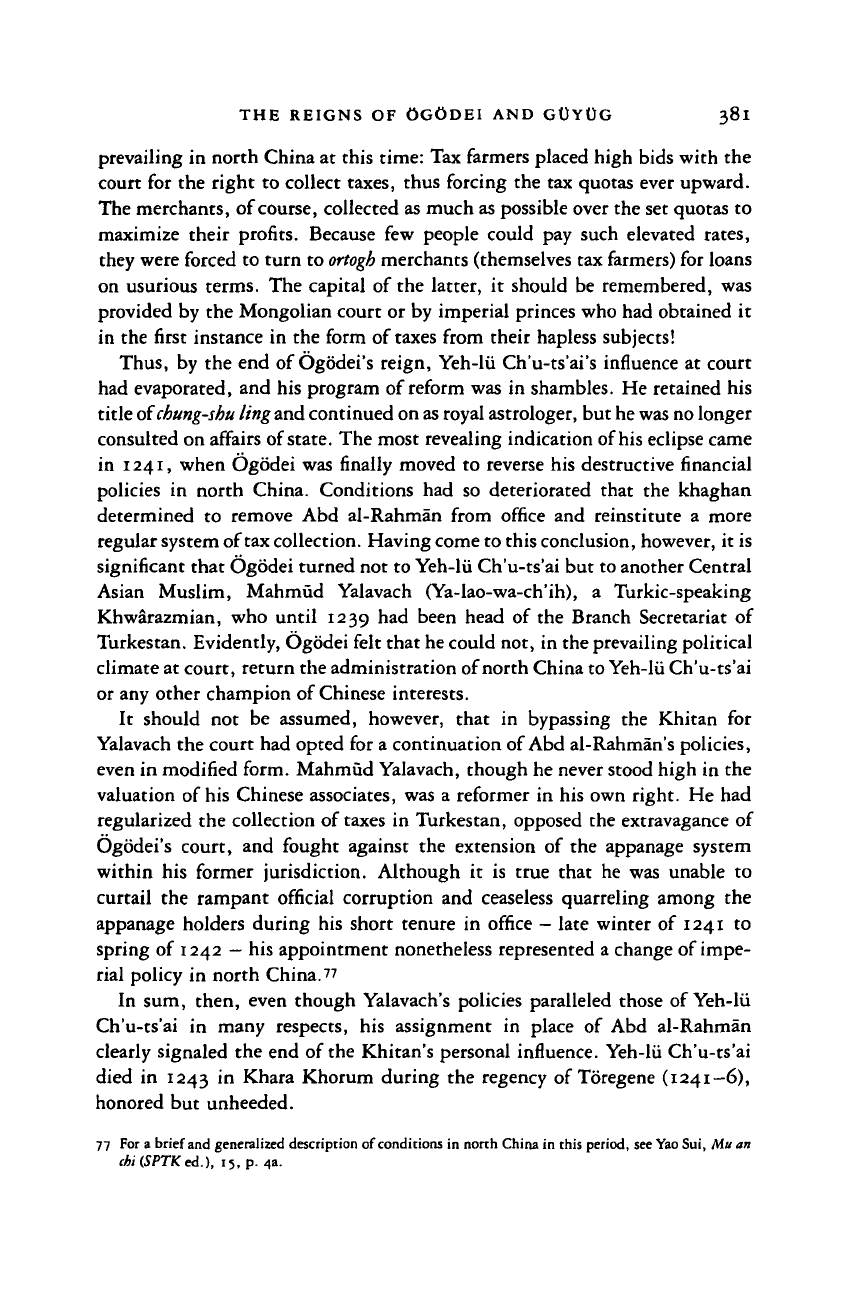
THE REIGNS OF OGODEI AND GOYOG 381
prevailing in north China at this time: Tax farmers placed high bids with the
court for the right to collect taxes, thus forcing the tax quotas ever upward.
The merchants, of course, collected as much as possible over the set quotas to
maximize their profits. Because few people could pay such elevated rates,
they were forced to turn to
ortogh
merchants (themselves tax farmers) for loans
on usurious terms. The capital of the latter, it should be remembered, was
provided by the Mongolian court or by imperial princes who had obtained it
in the first instance in the form of taxes from their hapless subjects!
Thus,
by the end of Ogodei's reign, Yeh-lii Ch'u-ts'ai's influence at court
had evaporated, and his program of reform was in shambles. He retained his
title oi
chung-shu
ling and continued on as royal astrologer, but he was no longer
consulted on affairs of
state.
The most revealing indication of
his
eclipse came
in 1241, when Ogbdei was finally moved to reverse his destructive financial
policies in north China. Conditions had so deteriorated that the khaghan
determined to remove Abd al-Rahman from office and reinstitute a more
regular system of tax collection. Having come to this conclusion, however, it is
significant that Ogodei turned not to Yeh-lii Ch'u-ts'ai but to another Central
Asian Muslim, Mahmiid Yalavach (Ya-lao-wa-ch'ih), a Turkic-speaking
Khwarazmian, who until 1239 had been head of the Branch Secretariat of
Turkestan. Evidently, Ogodei felt that he could not, in the prevailing political
climate at court, return the administration of north China to Yeh-lii Ch'u-ts'ai
or any other champion of Chinese interests.
It should not be assumed, however, that in bypassing the Khitan for
Yalavach the court had opted for a continuation of Abd al-Rahman's policies,
even in modified form. Mahmiid Yalavach, though he never stood high in the
valuation of his Chinese associates, was a reformer in his own right. He had
regularized the collection of taxes in Turkestan, opposed the extravagance of
Ogodei's court, and fought against the extension of the appanage system
within his former jurisdiction. Although it is true that he was unable to
curtail the rampant official corruption and ceaseless quarreling among the
appanage holders during his short tenure in office
—
late winter of 1241 to
spring of 1242 - his appointment nonetheless represented a change of impe-
rial policy in north China.
77
In sum, then, even though Yalavach's policies paralleled those of Yeh-lii
Ch'u-ts'ai in many respects, his assignment in place of Abd al-Rahman
clearly signaled the end of the Khitan's personal influence. Yeh-lii Ch'u-ts'ai
died in 1243 in Khara Khorum during the regency of Toregene (1241-6),
honored but unheeded.
77 For a brief and generalized description of conditions in north China in this period, see Yao Sui, Mu an
chi
(SPTK ed.), 15, p. 4a.
Cambridge Histories Online © Cambridge University Press, 2008
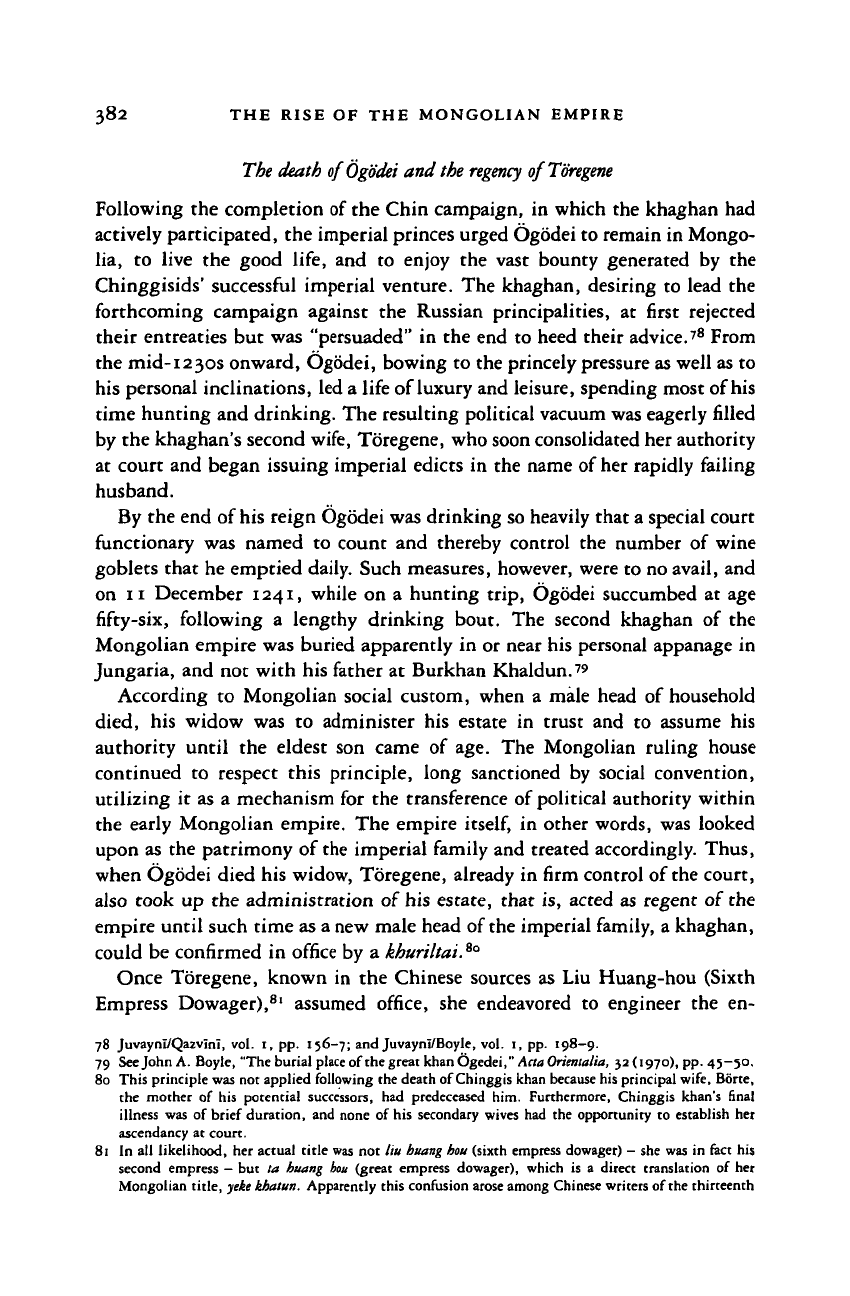
382 THE RISE OF THE MONGOLIAN EMPIRE
The death of
Ogodei
and the
regency
of Toregene
Following the completion of the Chin campaign, in which the khaghan had
actively participated, the imperial princes urged Ogodei to remain in Mongo-
lia, to live the good life, and to enjoy the vast bounty generated by the
Chinggisids' successful imperial venture. The khaghan, desiring to lead the
forthcoming campaign against the Russian principalities, at first rejected
their entreaties but was "persuaded" in the end to heed their advice.
78
From
the mid-i23os onward, Ogodei, bowing to the princely pressure as well as to
his personal inclinations, led a life of luxury and leisure, spending most of his
time hunting and drinking. The resulting political vacuum was eagerly filled
by the khaghan's second wife, Toregene, who soon consolidated her authority
at court and began issuing imperial edicts in the name of her rapidly failing
husband.
By the end of
his
reign Ogodei was drinking so heavily that a special court
functionary was named to count and thereby control the number of wine
goblets that he emptied daily. Such measures, however, were to no avail, and
on 11 December 1241, while on a hunting trip, Ogodei succumbed at age
fifty-six, following a lengthy drinking bout. The second khaghan of the
Mongolian empire was buried apparently in or near his personal appanage in
Jungaria, and not with his father at Burkhan Khaldun.
79
According to Mongolian social custom, when a male head of household
died, his widow was to administer his estate in trust and to assume his
authority until the eldest son came of age. The Mongolian ruling house
continued to respect this principle, long sanctioned by social convention,
utilizing it as a mechanism for the transference of political authority within
the early Mongolian empire. The empire
itself,
in other words, was looked
upon as the patrimony of the imperial family and treated accordingly. Thus,
when Ogodei died his widow, Toregene, already in firm control of the court,
also took up the administration of his estate, that is, acted as regent of the
empire until such time as a new male head of
the
imperial family, a khaghan,
could be confirmed in office by a khuriltai.
8o
Once Toregene, known in the Chinese sources as Liu Huang-hou (Sixth
Empress Dowager),
81
assumed office, she endeavored to engineer the en-
78 Juvaynl/Qazvinl, vol. i,pp. 156-7; and Juvaynl/Boyle, vol. i,pp- 198—9.
79 See John
A.
Boyle, "The burial place of the great khan Ogedei," Ada
Orimtalia,
32 (1970), pp. 45—50.
80 This principle was not applied following the death of Chinggis khan because his principal wife, Borte,
the mother of his potential successors, had predeceased him. Furthermore, Chinggis khan's final
illness was of brief duration, and none of his secondary wives had the opportunity to establish her
ascendancy at court.
81 In all likelihood, her actual title was not liu
buang hou
(sixth empress dowager) - she was in fact his
second empress
—
but ta huang
hou
(great empress dowager), which is a direct translation of her
Mongolian title,
yeke
khatun.
Apparently this confusion arose among Chinese writers of
the
thirteenth
Cambridge Histories Online © Cambridge University Press, 2008
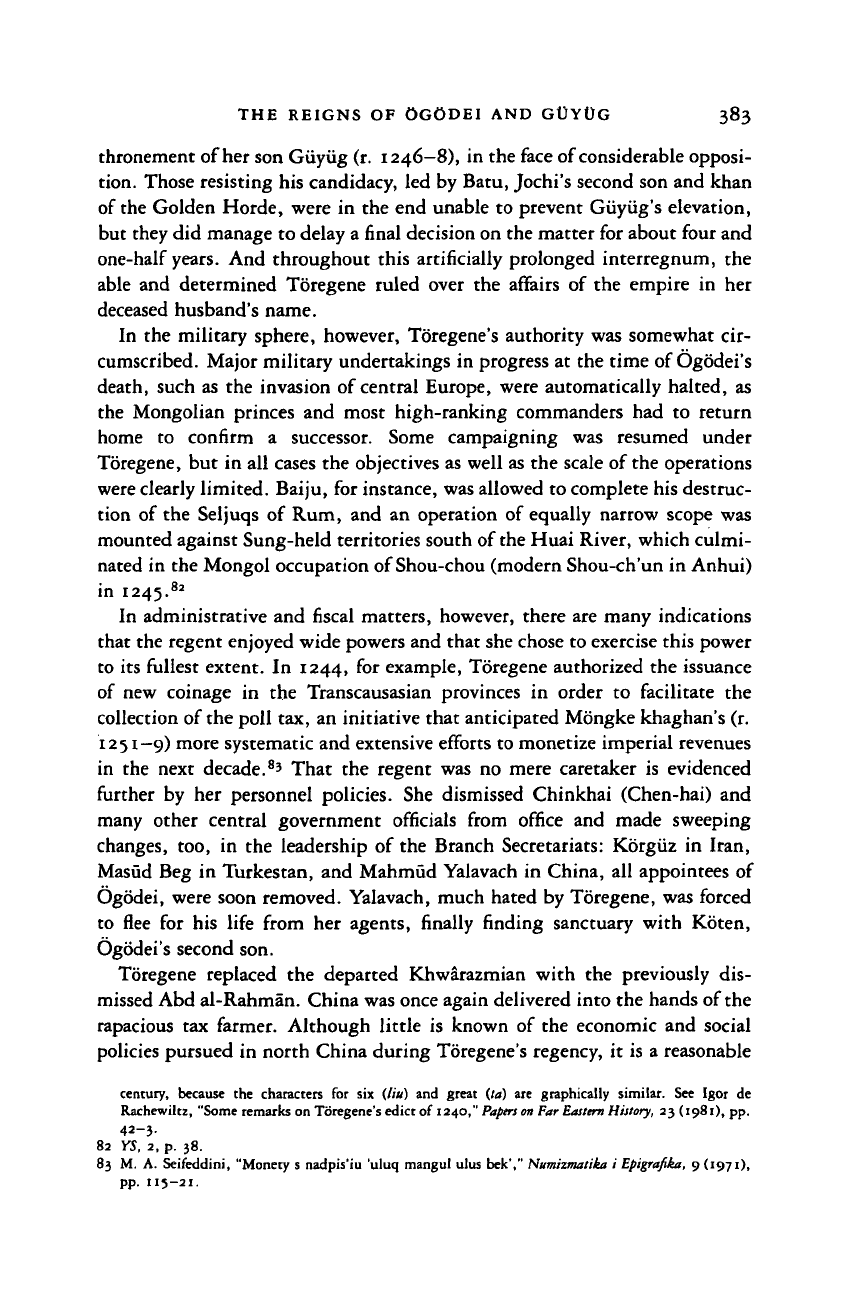
THE REIGNS OF OGODEI AND
GOYOG
383
thronement of her son Giiyiig (r. 1246—8), in the face of considerable opposi-
tion. Those resisting his candidacy, led by Batu, Jochi's second son and khan
of the Golden Horde, were in the end unable to prevent Giiyiig's elevation,
but they did manage to delay a final decision on the matter for about four and
one-half years. And throughout this artificially prolonged interregnum, the
able and determined Toregene ruled over the affairs of the empire in her
deceased husband's name.
In the military sphere, however, Toregene's authority was somewhat cir-
cumscribed. Major military undertakings in progress at the time of Ogodei's
death, such as the invasion of central Europe, were automatically halted, as
the Mongolian princes and most high-ranking commanders had to return
home to confirm a successor. Some campaigning was resumed under
Toregene, but in all cases the objectives as well as the scale of the operations
were clearly limited. Baiju, for instance, was allowed to complete his destruc-
tion of the Seljuqs of Rum, and an operation of equally narrow scope was
mounted against Sung-held territories south of the Huai River, which culmi-
nated in the Mongol occupation of Shou-chou (modern Shou-ch'un in Anhui)
in 1245.
82
In administrative and fiscal matters, however, there are many indications
that the regent enjoyed wide powers and that she chose to exercise this power
to its fullest extent. In 1244, for example, Toregene authorized the issuance
of new coinage in the Transcausasian provinces in order to facilitate the
collection of the poll tax, an initiative that anticipated Mongke khaghan's (r.
1251—9) more systematic and extensive efforts to monetize imperial revenues
in the next decade.
8
' That the regent was no mere caretaker is evidenced
further by her personnel policies. She dismissed Chinkhai (Chen-hai) and
many other central government officials from office and made sweeping
changes, too, in the leadership of the Branch Secretariats: Korgiiz in Iran,
Masud Beg in Turkestan, and Mahmud Yalavach in China, all appointees of
Ogodei, were soon removed. Yalavach, much hated by Toregene, was forced
to flee for his life from her agents, finally finding sanctuary with Koten,
Ogodei's second son.
Toregene replaced the departed Khwarazmian with the previously dis-
missed Abd al-Rahman. China was once again delivered into the hands of the
rapacious tax farmer. Although little is known of the economic and social
policies pursued in north China during Toregene's regency, it is a reasonable
century, because the characters for six
(//'»)
and great (to) are graphically similar. See Igor de
Rachewiltz, "Some remarks on Toregene's edict of 1240," Papm
on
Far
Eastern
History, 23 (1981), pp.
42-3.
82 YS, 2, p. 38.
83 M. A. Seifeddini, "Monety s nadpis'iu 'uluq mangul ulus bek'," Numizmatika i Epigrafika, 9 (1971),
pp.
115-21.
Cambridge Histories Online © Cambridge University Press, 2008
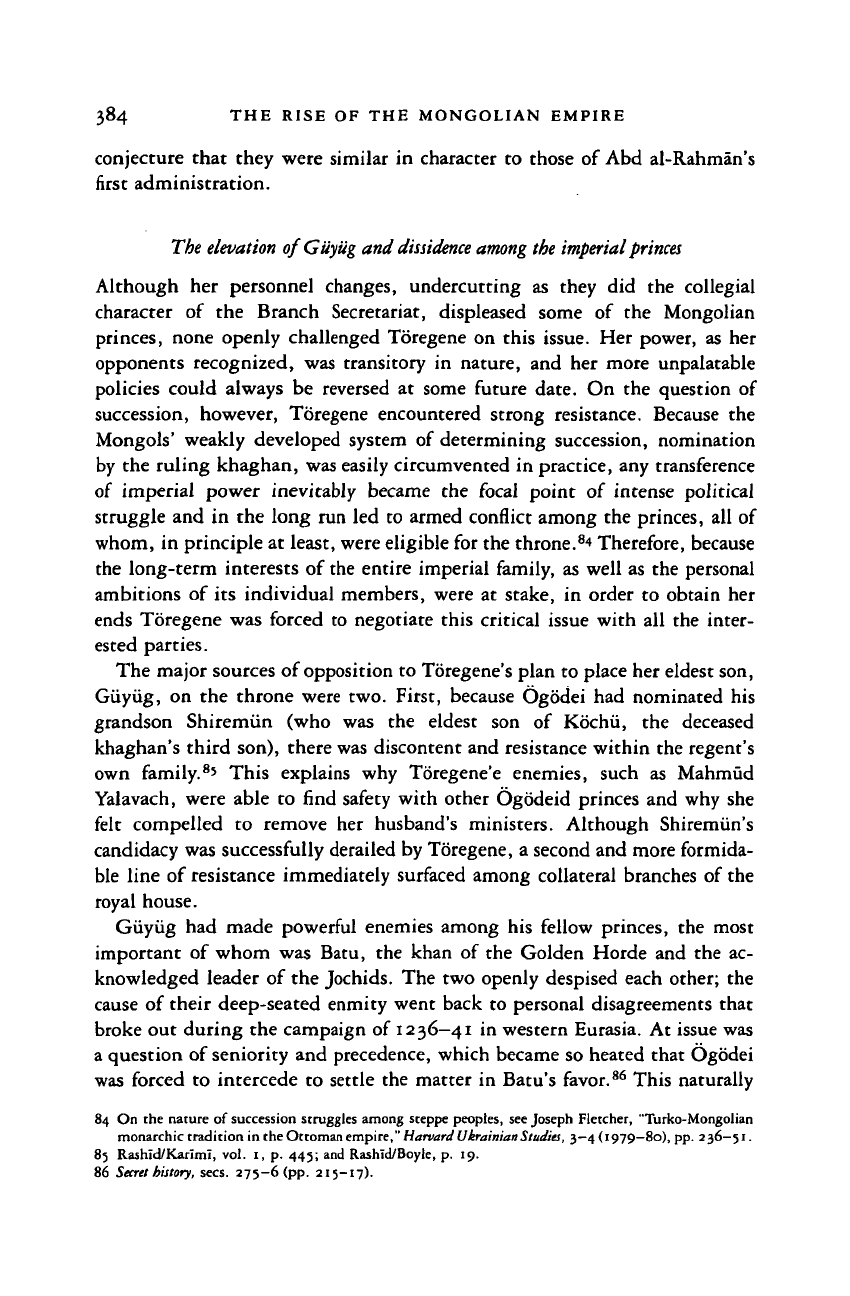
384 THE RISE OF THE MONGOLIAN EMPIRE
conjecture that they were similar in character to those of Abd al-Rahman's
first administration.
The
elevation
ofGilyiig and
dhsidence among
the imperial princes
Although her personnel changes, undercutting as they did the collegial
character of the Branch Secretariat, displeased some of the Mongolian
princes, none openly challenged Toregene on this issue. Her power, as her
opponents recognized, was transitory in nature, and her more unpalatable
policies could always be reversed at some future date. On the question of
succession, however, Toregene encountered strong resistance. Because the
Mongols' weakly developed system of determining succession, nomination
by the ruling khaghan, was easily circumvented in practice, any transference
of imperial power inevitably became the focal point of intense political
struggle and in the long run led to armed conflict among the princes, all of
whom, in principle at least, were eligible for the throne.
84
Therefore, because
the long-term interests of the entire imperial family, as well as the personal
ambitions of its individual members, were at stake, in order to obtain her
ends Toregene was forced to negotiate this critical issue with all the inter-
ested parties.
The major sources of opposition to Toregene's plan to place her eldest son,
Giiyiig, on the throne were two. First, because Ogodei had nominated his
grandson Shiremiin (who was the eldest son of Kochii, the deceased
khaghan's third son), there was discontent and resistance within the regent's
own family.
8
' This explains why Toregene'e enemies, such as Mahmud
Yalavach, were able to find safety with other Ogodeid princes and why she
felt compelled to remove her husband's ministers. Although Shiremiin's
candidacy was successfully derailed by Toregene, a second and more formida-
ble line of resistance immediately surfaced among collateral branches of the
royal house.
Giiyiig had made powerful enemies among his fellow princes, the most
important of whom was Batu, the khan of the Golden Horde and the ac-
knowledged leader of the Jochids. The two openly despised each other; the
cause of their deep-seated enmity went back to personal disagreements that
broke out during the campaign of
1236—41
in western Eurasia. At issue was
a question of seniority and precedence, which became so heated that Ogodei
was forced to intercede to settle the matter in Batu's favor.
86
This naturally
84 On the nature of succession struggles among steppe peoples, see Joseph Fletcher, "Turko-Mongolian
monarchic tradition in the Ottoman empire," Harvard Ukrainian
Studies,
3-4 (1979—80), pp. 236-51.
8; Rashld/Karimi, vol. 1, p. 443; and Rashid/Boyle, p. 19.
86
Secret
history, sees. 275—6 (pp. 215-17).
Cambridge Histories Online © Cambridge University Press, 2008
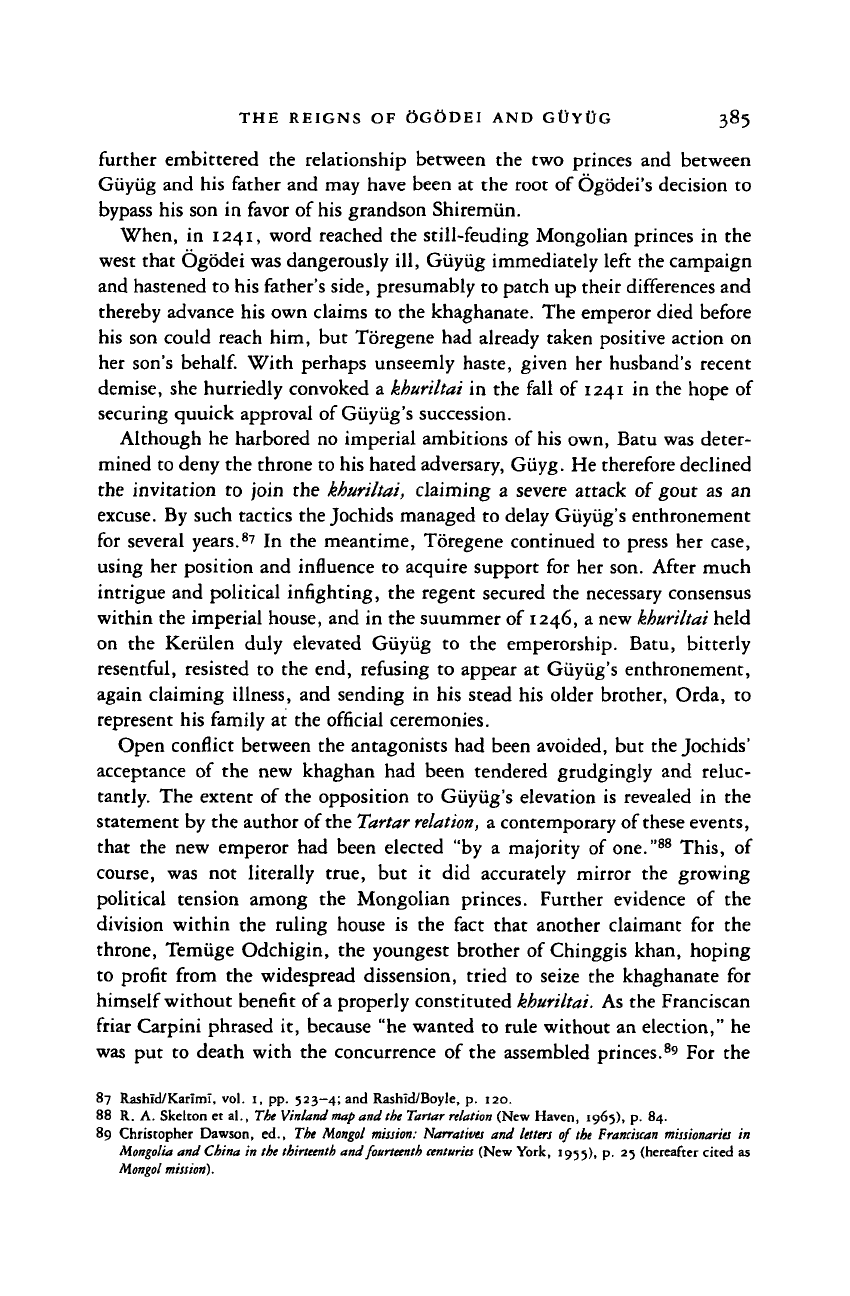
THE REIGNS OF OGODEI AND GtJYtJG 385
further embittered the relationship between the two princes and between
Giiyiig and his father and may have been at the root of Ogodei's decision to
bypass his son in favor of his grandson Shiremiin.
When, in 1241, word reached the still-feuding Mongolian princes in the
west that Ogodei was dangerously ill, Giiyiig immediately left the campaign
and hastened to his father's side, presumably to patch up their differences and
thereby advance his own claims to the khaghanate. The emperor died before
his son could reach him, but Toregene had already taken positive action on
her son's
behalf.
With perhaps unseemly haste, given her husband's recent
demise, she hurriedly convoked a khuriltai in the fall of 1241 in the hope of
securing quuick approval of Giiyiig's succession.
Although he harbored no imperial ambitions of his own, Batu was deter-
mined to deny the throne to his hated adversary, Giiyg. He therefore declined
the invitation to join the khuriltai, claiming a severe attack of gout as an
excuse. By such tactics the Jochids managed to delay Giiyiig's enthronement
for several years.
8
? In the meantime, Toregene continued to press her case,
using her position and influence to acquire support for her son. After much
intrigue and political infighting, the regent secured the necessary consensus
within the imperial house, and in the suummer of 1246, a new khuriltai held
on the Keriilen duly elevated Giiyiig to the emperorship. Batu, bitterly
resentful, resisted to the end, refusing to appear at Giiyiig's enthronement,
again claiming illness, and sending in his stead his older brother, Orda, to
represent his family at the official ceremonies.
Open conflict between the antagonists had been avoided, but the Jochids'
acceptance of the new khaghan had been tendered grudgingly and reluc-
tantly. The extent of the opposition to Giiyiig's elevation is revealed in the
statement by the author of the Tartar
relation,
a contemporary of these events,
that the new emperor had been elected "by a majority of one."
88
This, of
course, was not literally true, but it did accurately mirror the growing
political tension among the Mongolian princes. Further evidence of the
division within the ruling house is the fact that another claimant for the
throne, Temiige Odchigin, the youngest brother of Chinggis khan, hoping
to profit from the widespread dissension, tried to seize the khaghanate for
himself without benefit of
a
properly constituted khuriltai. As the Franciscan
friar Carpini phrased it, because "he wanted to rule without an election," he
was put to death with the concurrence of the assembled princes.
89
For the
87 Rashld/Kariml, vol. i, pp. 523—4; and Rashid/Boyle, p. 120.
88 R. A. Skelton et al., The Vinland map andthe Tartar
relation
(New Haven, 1965), p. 84.
89 Christopher Dawson, ed., The Mongol mission: Narratives and letters of the
Franciscan missionaries
in
Mongolia and China in the
thirteenth
and
fourteenth centuries
(New York, 1955), p. 25 (hereafter cited as
Mongol
mission).
Cambridge Histories Online © Cambridge University Press, 2008
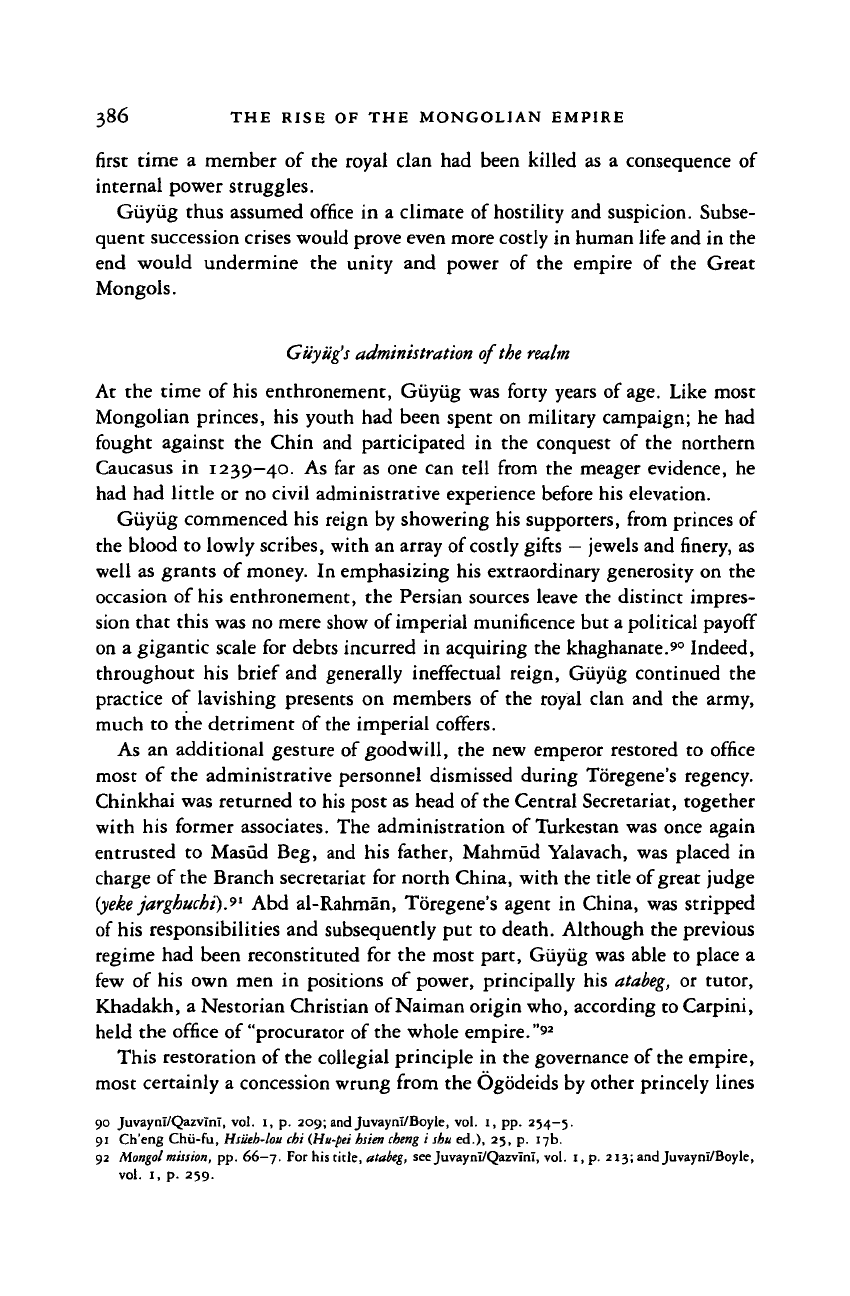
386 THE RISE OF THE MONGOLIAN EMPIRE
first time a member of the royal clan had been killed as a consequence of
internal power struggles.
Giiyiig thus assumed office in a climate of hostility and suspicion. Subse-
quent succession crises would prove even more costly in human life and in the
end would undermine the unity and power of the empire of the Great
Mongols.
Giiyiig's
administration of the
realm
At the time of his enthronement, Giiyiig was forty years of
age.
Like most
Mongolian princes, his youth had been spent on military campaign; he had
fought against the Chin and participated in the conquest of the northern
Caucasus in 1239-40. As far as one can tell from the meager evidence, he
had had little or no civil administrative experience before his elevation.
Giiyiig commenced his reign by showering his supporters, from princes of
the blood to lowly scribes, with an array of costly gifts
—
jewels and
finery,
as
well as grants of money. In emphasizing his extraordinary generosity on the
occasion of his enthronement, the Persian sources leave the distinct impres-
sion that this was no mere show of imperial munificence but a political payoff
on a gigantic scale for debts incurred in acquiring the khaghanate.'
0
Indeed,
throughout his brief and generally ineffectual reign, Giiyiig continued the
practice of lavishing presents on members of the royal clan and the army,
much to the detriment of the imperial coffers.
As an additional gesture of goodwill, the new emperor restored to office
most of the administrative personnel dismissed during Toregene's regency.
Chinkhai was returned to his post as head of the Central Secretariat, together
with his former associates. The administration of Turkestan was once again
entrusted to Masud Beg, and his father, Mahmud Yalavach, was placed in
charge of the Branch secretariat for north China, with the title of great judge
(yeke
jarghuchi).'*
1
Abd al-Rahman, Toregene's agent in China, was stripped
of his responsibilities and subsequently put to death. Although the previous
regime had been reconstituted for the most part, Giiyiig was able to place a
few of his own men in positions of power, principally his
atabeg,
or tutor,
Khadakh, a Nestorian Christian of Naiman origin who, according to Carpini,
held the office of "procurator of the whole empire."
92
This restoration of the collegial principle in the governance of the empire,
most certainly a concession wrung from the Ogodeids by other princely lines
90 Juvaynl/Qazvinl, vol. I, p. 209; and Juvaynl/Boyle, vol. 1, pp. 254—5.
91
Ch'eng
Chii-fu,
Hsiieb-lou
chi
(Hu-pei hsien cheng
i shu ed.), 25, p. 17b.
92
Mongol
mission,
pp.
66—7.
For his
title,
atabeg,
see Juvaynl/Qazvinl,
vol. i,p.
2i3;andJuvaynI/Boyle,
vol.
1, p. 259.
Cambridge Histories Online © Cambridge University Press, 2008
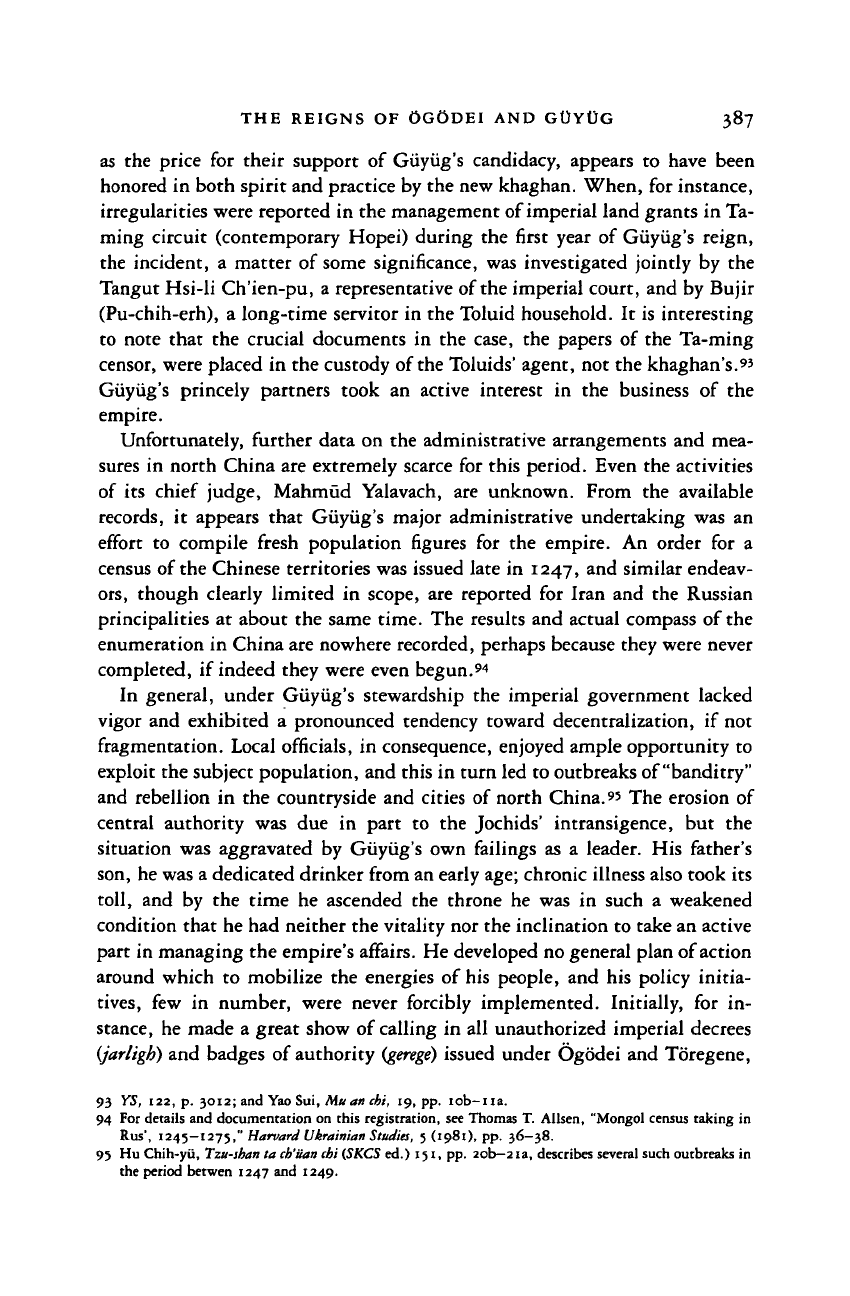
THE REIGNS OF OGODEI AND GOYtJG 387
as the price for their support of Giiyiig's candidacy, appears to have been
honored in both spirit and practice by the new khaghan. When, for instance,
irregularities were reported in the management of imperial land grants in Ta-
ming circuit (contemporary Hopei) during the first year of Giiyiig's reign,
the incident, a matter of some significance, was investigated jointly by the
Tangut Hsi-li Ch'ien-pu, a representative of
the
imperial court, and by Bujir
(Pu-chih-erh), a long-time servitor in the Toluid household. It is interesting
to note that the crucial documents in the case, the papers of the Ta-ming
censor, were placed in the custody of
the
Toluids' agent, not the khaghan's.
93
Giiyiig's princely partners took an active interest in the business of the
empire.
Unfortunately, further data on the administrative arrangements and mea-
sures in north China are extremely scarce for this period. Even the activities
of its chief judge, Mahmud Yalavach, are unknown. From the available
records, it appears that Giiyiig's major administrative undertaking was an
effort to compile fresh population figures for the empire. An order for a
census of the Chinese territories was issued late in 1247, and similar endeav-
ors,
though clearly limited in scope, are reported for Iran and the Russian
principalities at about the same time. The results and actual compass of the
enumeration in China are nowhere recorded, perhaps because they were never
completed, if indeed they were even begun.
94
In general, under Giiyiig's stewardship the imperial government lacked
vigor and exhibited a pronounced tendency toward decentralization, if not
fragmentation. Local officials, in consequence, enjoyed ample opportunity to
exploit the subject population, and this in turn led to outbreaks of "banditry"
and rebellion in the countryside and cities of north China.
9
' The erosion of
central authority was due in part to the Jochids' intransigence, but the
situation was aggravated by Giiyiig's own failings as a leader. His father's
son, he was a dedicated drinker from an early age; chronic illness also took its
toll, and by the time he ascended the throne he was in such a weakened
condition that he had neither the vitality nor the inclination to take an active
part in managing the empire's affairs. He developed no general plan of action
around which to mobilize the energies of his people, and his policy initia-
tives,
few in number, were never forcibly implemented. Initially, for in-
stance, he made a great show of calling in all unauthorized imperial decrees
(jarligh)
and badges of authority
{gerege)
issued under Ogodei and Toregene,
93 YS, 122, p. 3012; and Yao Sui, Muancbi, 19, pp. lob-na.
94 For details and documentation on this registration, see Thomas T. Allscn, "Mongol census taking in
Rus',
1245—1275," Harvard Ukrainian Studies, 5 (1981), pp. 36—38.
95 Hu Chih-yu, Tzu-shan ta
ch'iian
chi (SKCS ed.) 151, pp.
20b—
2
ia, describes several such outbreaks in
the period betwen 1247 and 1249.
Cambridge Histories Online © Cambridge University Press, 2008
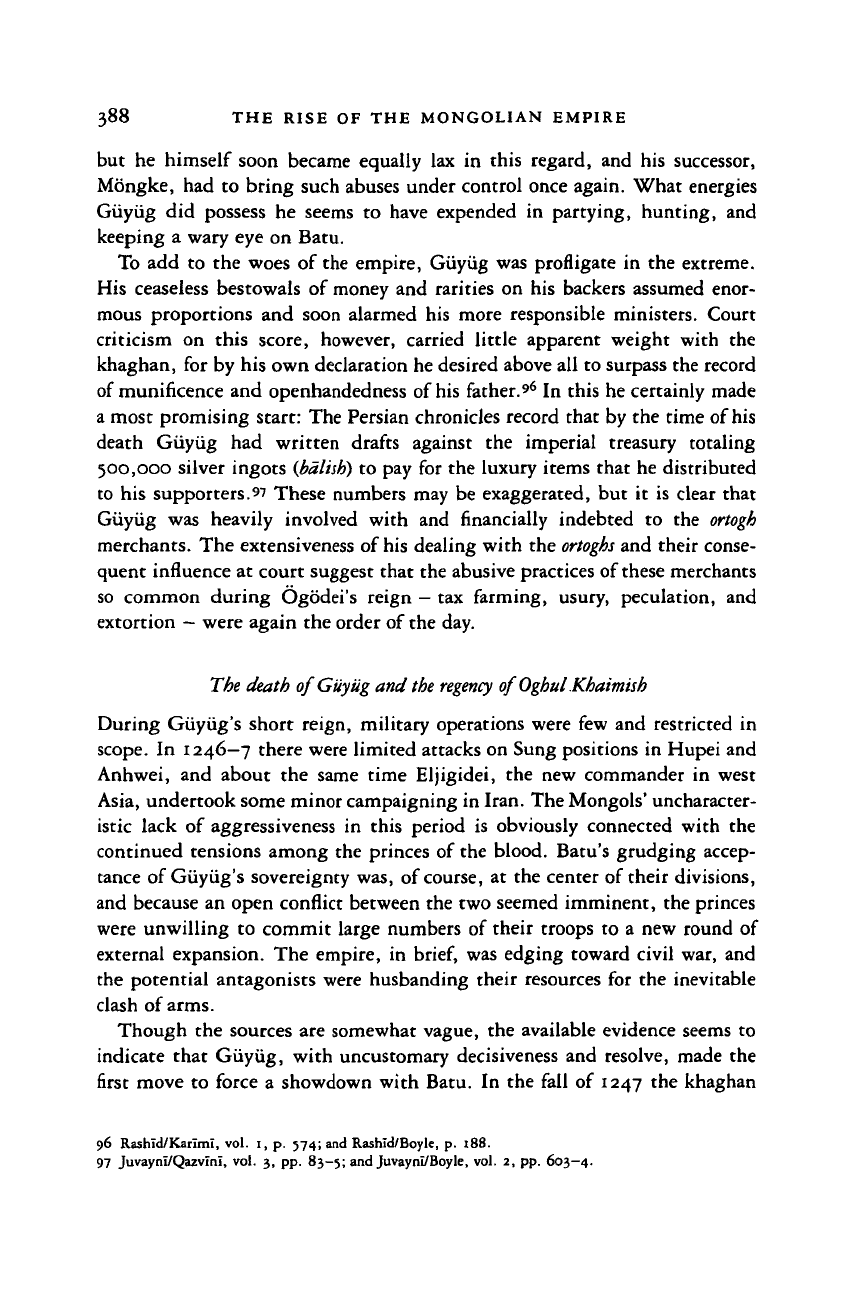
388 THE RISE OF THE MONGOLIAN EMPIRE
but he himself soon became equally lax in this regard, and his successor,
Mongke, had to bring such abuses under control once again. What energies
Giiyiig did possess he seems to have expended in partying, hunting, and
keeping a wary eye on Batu.
To add to the woes of the empire, Giiyiig was profligate in the extreme.
His ceaseless bestowals of money and rarities on his backers assumed enor-
mous proportions and soon alarmed his more responsible ministers. Court
criticism on this score, however, carried little apparent weight with the
khaghan, for by his own declaration he desired above all to surpass the record
of munificence and openhandedness of his father.'
6
In this he certainly made
a most promising start: The Persian chronicles record that by the time of
his
death Giiyiig had written drafts against the imperial treasury totaling
500,000 silver ingots
(Jbdlish)
to pay for the luxury items that he distributed
to his supporters.
9
' These numbers may be exaggerated, but it is clear that
Giiyiig was heavily involved with and financially indebted to the
ortogh
merchants. The extensiveness of his dealing with the
ortoghs
and their conse-
quent influence at court suggest that the abusive practices of
these
merchants
so common during Ogodei's reign - tax farming, usury, peculation, and
extortion
—
were again the order of the day.
The death of Giiyiig and
the regency
of Oghul Khaimish
During Giiyiig's short reign, military operations were few and restricted in
scope. In 1246—7 there were limited attacks on Sung positions in Hupei and
Anhwei, and about the same time Eljigidei, the new commander in west
Asia, undertook some minor campaigning in Iran. The Mongols' uncharacter-
istic lack of aggressiveness in this period is obviously connected with the
continued tensions among the princes of the blood. Batu's grudging accep-
tance of Giiyiig's sovereignty was, of
course,
at the center of their divisions,
and because an open conflict between the two seemed imminent, the princes
were unwilling to commit large numbers of their troops to a new round of
external expansion. The empire, in
brief,
was edging toward civil war, and
the potential antagonists were husbanding their resources for the inevitable
clash of arms.
Though the sources are somewhat vague, the available evidence seems to
indicate that Giiyiig, with uncustomary decisiveness and resolve, made the
first move to force a showdown with Batu. In the fall of 1247 the khaghan
96 Rashld/Karlml, vol. i, p. 574; and RashTd/Boyle, p. 188.
97 Juvayni/Qazvinl, vol. 3, pp. 83-5; and Juvaynl/Boyle, vol. 2, pp. 603—4.
Cambridge Histories Online © Cambridge University Press, 2008
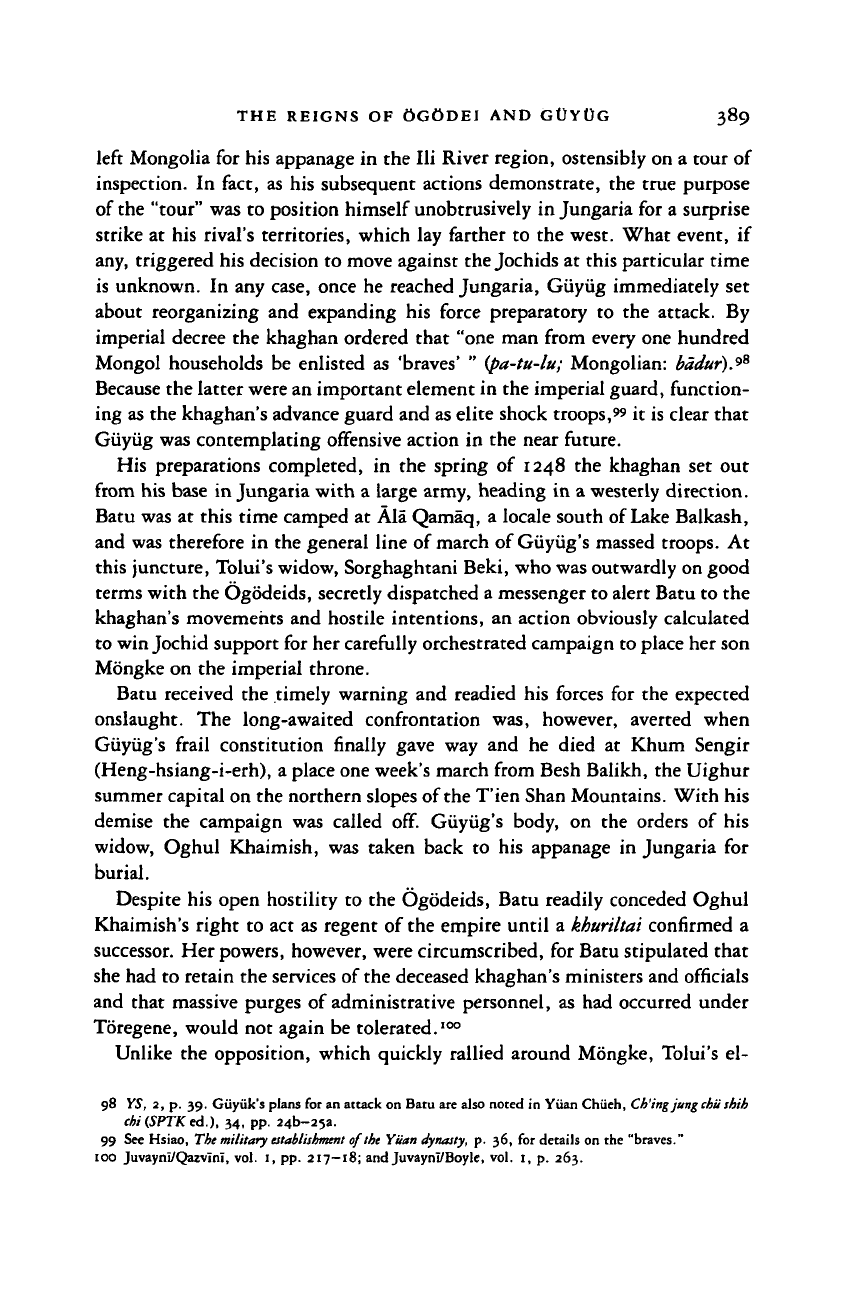
THE REIGNS OF OGODEI AND
GOYOG
389
left Mongolia for his appanage in the Hi River region, ostensibly on a tour of
inspection. In fact, as his subsequent actions demonstrate, the true purpose
of the "tour" was to position himself unobtrusively in Jungaria for a surprise
strike at his rival's territories, which lay farther to the west. What event, if
any, triggered his decision to move against
the
Jochids at this particular time
is unknown. In any case, once he reached Jungaria, Giiyiig immediately set
about reorganizing and expanding his force preparatory to the attack. By
imperial decree the khaghan ordered that "one man from every one hundred
Mongol households be enlisted as 'braves' "
(pa-tu-lu;
Mongolian:
badur).**
Because the latter were an important element in the imperial guard, function-
ing as the khaghan's advance guard and as elite shock troops," it is clear that
Giiyiig was contemplating offensive action in the near future.
His preparations completed, in the spring of 1248 the khaghan set out
from his base in Jungaria with a large army, heading in a westerly direction.
Batu was at this time camped at Ala Qamaq, a locale south of
Lake
Balkash,
and was therefore in the general line of march of Giiyiig's massed troops. At
this juncture, Tolui's widow, Sorghaghtani Beki, who was outwardly on good
terms with the Ogodeids, secretly dispatched a messenger to alert Batu to the
khaghan's movements and hostile intentions, an action obviously calculated
to win Jochid support for her carefully orchestrated campaign to place her son
Mongke on the imperial throne.
Batu received the timely warning and readied his forces for the expected
onslaught. The long-awaited confrontation was, however, averted when
Giiyiig's frail constitution finally gave way and he died at Khum Sengir
(Heng-hsiang-i-erh), a place one week's march from Besh Balikh, the Uighur
summer capital on the northern slopes of the
T'ien
Shan Mountains. With his
demise the campaign was called off. Giiyiig's body, on the orders of his
widow, Oghul Khaimish, was taken back to his appanage in Jungaria for
burial.
Despite his open hostility to the Ogodeids, Batu readily conceded Oghul
Khaimish's right to act as regent of the empire until a
khuriltai
confirmed a
successor. Her powers, however, were circumscribed, for Batu stipulated that
she had to retain the services of the deceased khaghan's ministers and officials
and that massive purges of administrative personnel, as had occurred under
Toregene, would not again be tolerated.
100
Unlike the opposition, which quickly rallied around Mongke, Tolui's el-
98 YS, 2, p. 39. Giiyiik's plans for an attack on Batu are also noted in Yuan Chiieh, Ctiingjungchiishih
chi (SPTK ed.), 34, pp. 240-253.
99 See Hsiao, The military
establishment
of the Yiian dynasty, p. 36, for details on the "braves."
100 Juvaynl/Qazvlnl, vol. 1, pp. 217—18; and Juvaynl/Boyle, vol. 1, p. 263.
Cambridge Histories Online © Cambridge University Press, 2008
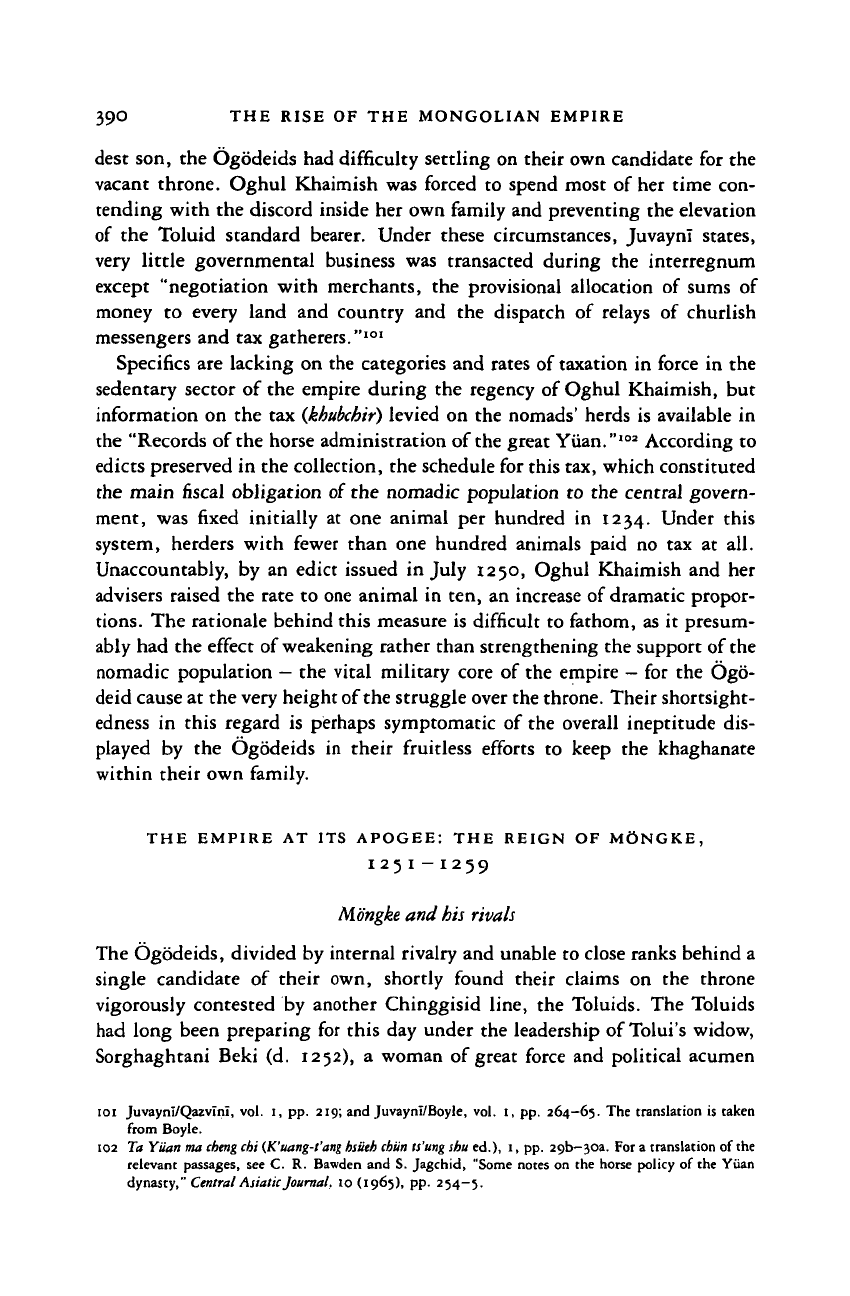
39°
THE
RISE
OF THE
MONGOLIAN EMPIRE
dest son,
the
Ogodeids had difficulty settling
on
their own candidate
for the
vacant throne. Oghul Khaimish
was
forced
to
spend most
of her
time
con-
tending with
the
discord inside
her
own family
and
preventing the elevation
of
the
Toluid standard bearer. Under these circumstances, Juvaynl states,
very little governmental business
was
transacted during
the
interregnum
except "negotiation with merchants,
the
provisional allocation
of
sums
of
money
to
every land
and
country
and the
dispatch
of
relays
of
churlish
messengers
and tax
gatherers."
101
Specifics
are
lacking
on the
categories
and
rates
of
taxation
in
force
in the
sedentary sector
of
the empire during
the
regency
of
Oghul Khaimish,
but
information
on the tax
(khubchir)
levied
on the
nomads' herds
is
available
in
the "Records
of
the horse administration
of
the great Yiian."
102
According
to
edicts preserved
in
the collection, the schedule
for
this tax, which constituted
the main fiscal obligation
of
the nomadic population
to the
central govern-
ment,
was
fixed initially
at
one
animal
per
hundred
in
1234.
Under this
system, herders with fewer than
one
hundred animals paid
no tax
at
all.
Unaccountably,
by an
edict issued
in
July
1250,
Oghul Khaimish
and her
advisers raised
the
rate
to
one animal
in ten, an
increase
of
dramatic propor-
tions.
The
rationale behind this measure
is
difficult
to
fathom,
as it
presum-
ably
had
the effect of weakening rather than strengthening the support
of
the
nomadic population
—
the
vital military core
of
the empire
-
for the Ogo-
deid cause
at
the very height of the struggle over the throne. Their shortsight-
edness
in
this regard
is
perhaps symptomatic
of
the overall ineptitude
dis-
played
by
the
Ogodeids
in
their fruitless efforts
to
keep
the
khaghanate
within their own family.
THE EMPIRE AT ITS APOGEE: THE REIGN OF MONGKE,
1251-1259
Mb'ngke
and
his rivals
The Ogodeids, divided
by
internal rivalry
and
unable
to
close ranks behind
a
single candidate
of
their
own,
shortly found their claims
on
the
throne
vigorously contested
by
another Chinggisid line,
the
Toluids.
The
Toluids
had long been preparing
for
this
day
under
the
leadership
of
Tolui's widow,
Sorghaghtani Beki
(d.
1252),
a
woman
of
great force
and
political acumen
101 Juvaynl/Qazvini, vol.
i,
pp. 219; and Juvaynl/Boyle, vol. 1, pp. 264—65. The translation
is
taken
from Boyle.
102 Ta
Yuan
ma
chtng
chi
(K'uang-t'ang hsiuh
chu'n
ts'ung
shu
ed.),
1, pp.
29b—30a.
For
a
translation
of the
relevant passages, see C.
R.
Bawden and
S.
Jagchid, "Some notes
on
the horse policy
of
the Yuan
dynasty," Central Asiatic Journal, 10 (1965), pp. 254-5.
Cambridge Histories Online © Cambridge University Press, 2008
